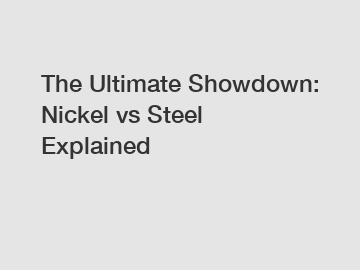The Ultimate Showdown: Nickel vs Steel Explained
When it comes to choosing the right material for your project, whether it be for construction, manufacturing, or any other application, the decision between nickel and steel can be a tough one. Both materials have their own unique set of properties and characteristics that make them suitable for different types of projects. In this blog post, we will delve into the ultimate showdown between nickel and steel, explaining the differences between the two and helping you make an informed decision when choosing the right material for your needs.
Nickel and steel are both widely used metals in various industries due to their strength, durability, and versatility. However, they have distinct differences that set them apart from each other. Nickel is a silvery-white metal with excellent corrosion resistance, high heat resistance, and good electrical conductivity. It is often used in applications where these properties are desirable, such as in the production of stainless steel, electroplating, and the manufacturing of various alloys. Steel, on the other hand, is an alloy of iron and carbon that is known for its hardness, strength, and toughness. It is used in a wide range of applications, from construction and automotive manufacturing to the production of tools and machinery.
One of the main differences between nickel and steel is their corrosion resistance properties. Nickel is highly resistant to corrosion, making it ideal for applications where exposure to moisture or chemicals is a concern. Steel, on the other hand, is prone to rust and corrosion, especially in environments with high humidity or exposure to saltwater. This is why stainless steel, which contains nickel as an alloying element, is often used in applications where corrosion resistance is crucial.

Another key difference between nickel and steel is their heat resistance properties. Nickel has a high melting point and excellent heat resistance, making it suitable for use in high-temperature applications such as in the production of gas turbines, chemical processing equipment, and aerospace components. Steel, while still strong and durable, has lower heat resistance compared to nickel and may deform or lose its strength at high temperatures.
In terms of cost, nickel is generally more expensive than steel. This is due to the fact that nickel is a rarer metal and its extraction and refining processes are more complex and expensive. Steel, on the other hand, is a widely available material that is relatively inexpensive to produce. When considering cost as a factor in your material selection, it is important to weigh the benefits of nickel's unique properties against the higher price tag.
When it comes to strength, both nickel and steel are known for their durability and resilience. Steel is renowned for its hardness and toughness, making it an ideal material for applications that require strength and structural integrity. Nickel, while not as hard as steel, is still a strong and ductile metal that can withstand high stress and strain without fracturing. The choice between nickel and steel for your project will depend on the specific requirements of your application and the level of strength needed.
In conclusion, the ultimate showdown between nickel and steel comes down to understanding the unique properties and characteristics of each material and how they align with the requirements of your project. If corrosion resistance, heat resistance, and high strength are essential factors in your application, nickel may be the best choice for you. On the other hand, if cost-effectiveness and general durability are more important, steel may be the preferable option. Whichever material you choose, both nickel and steel are excellent choices for a wide range of applications and industries.
For more information, please visit n08904 pipe factory, s31254 stainless steel pipe fitting manufacturer, alloy 625 seamless nickel pipe.
84
0
0


Comments
All Comments (0)